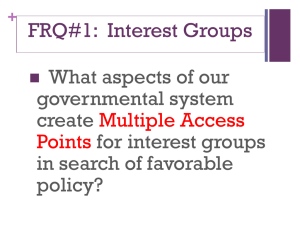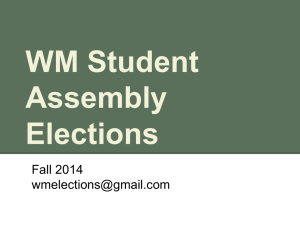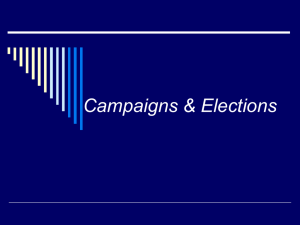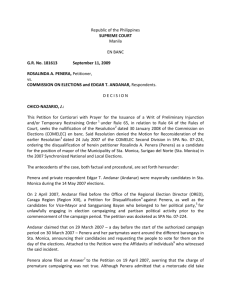Panera v. Comelec
advertisement
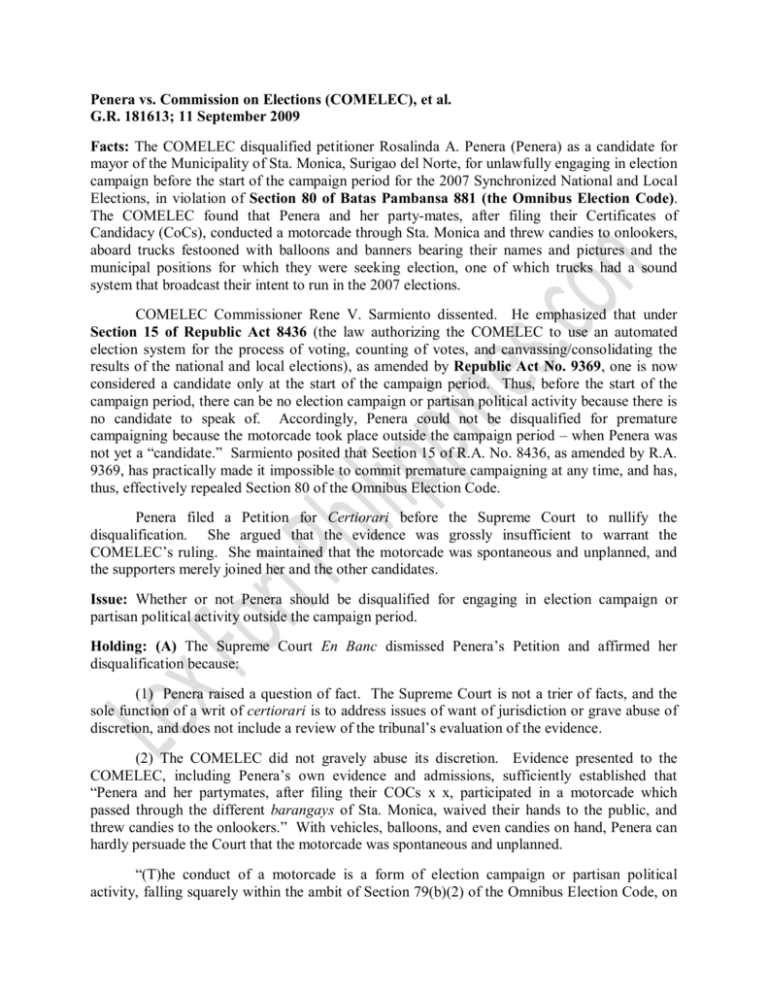
Penera vs. Commission on Elections (COMELEC), et al. G.R. 181613; 11 September 2009 Facts: The COMELEC disqualified petitioner Rosalinda A. Penera (Penera) as a candidate for mayor of the Municipality of Sta. Monica, Surigao del Norte, for unlawfully engaging in election campaign before the start of the campaign period for the 2007 Synchronized National and Local Elections, in violation of Section 80 of Batas Pambansa 881 (the Omnibus Election Code). The COMELEC found that Penera and her party-mates, after filing their Certificates of Candidacy (CoCs), conducted a motorcade through Sta. Monica and threw candies to onlookers, aboard trucks festooned with balloons and banners bearing their names and pictures and the municipal positions for which they were seeking election, one of which trucks had a sound system that broadcast their intent to run in the 2007 elections. COMELEC Commissioner Rene V. Sarmiento dissented. He emphasized that under Section 15 of Republic Act 8436 (the law authorizing the COMELEC to use an automated election system for the process of voting, counting of votes, and canvassing/consolidating the results of the national and local elections), as amended by Republic Act No. 9369, one is now considered a candidate only at the start of the campaign period. Thus, before the start of the campaign period, there can be no election campaign or partisan political activity because there is no candidate to speak of. Accordingly, Penera could not be disqualified for premature campaigning because the motorcade took place outside the campaign period – when Penera was not yet a “candidate.” Sarmiento posited that Section 15 of R.A. No. 8436, as amended by R.A. 9369, has practically made it impossible to commit premature campaigning at any time, and has, thus, effectively repealed Section 80 of the Omnibus Election Code. Penera filed a Petition for Certiorari before the Supreme Court to nullify the disqualification. She argued that the evidence was grossly insufficient to warrant the COMELEC’s ruling. She maintained that the motorcade was spontaneous and unplanned, and the supporters merely joined her and the other candidates. Issue: Whether or not Penera should be disqualified for engaging in election campaign or partisan political activity outside the campaign period. Holding: (A) The Supreme Court En Banc dismissed Penera’s Petition and affirmed her disqualification because: (1) Penera raised a question of fact. The Supreme Court is not a trier of facts, and the sole function of a writ of certiorari is to address issues of want of jurisdiction or grave abuse of discretion, and does not include a review of the tribunal’s evaluation of the evidence. (2) The COMELEC did not gravely abuse its discretion. Evidence presented to the COMELEC, including Penera’s own evidence and admissions, sufficiently established that “Penera and her partymates, after filing their COCs x x, participated in a motorcade which passed through the different barangays of Sta. Monica, waived their hands to the public, and threw candies to the onlookers.” With vehicles, balloons, and even candies on hand, Penera can hardly persuade the Court that the motorcade was spontaneous and unplanned. “(T)he conduct of a motorcade is a form of election campaign or partisan political activity, falling squarely within the ambit of Section 79(b)(2) of the Omnibus Election Code, on ‘[h]olding political caucuses, conferences, meetings, rallies, parades, or other similar assemblies, for the purpose of soliciting votes and/or undertaking any campaign or propaganda for or against a candidate[.]’ x x The obvious purpose of the conduct of motorcades is to introduce the candidates and the positions, to which they seek to be elected, to the voting public; or to make them more visible so as to facilitate the recognition and recollection of their names in the minds of the voters come election time. Unmistakably, motorcades are undertaken for no other purpose than to promote the election of a particular candidate or candidates.” Section 80 of the Omnibus Election Code prohibits any person, whether a voter, a candidate or a party, from engaging in any election campaign or partisan political activity outside the campaign period (except that political parties may hold political conventions or meetings to nominate their official candidates within 30 days before the campaign period and 45 days for Presidential and Vice-Presidential election). And, under Section 68 of the Omnibus Election Code, a candidate declared by final decision to have engaged in premature campaigning shall be disqualified from continuing as a candidate, or if he has been elected, from holding the office. Said candidate may also face criminal prosecution for an election offense under Section 262 of the same Code. Thus, Penera, who had been elected Mayor of Sta. Monica before the COMELEC rendered its decision, was disqualified from holding the said office. The proclaimed Vice-Mayor was declared her rightful successor pursuant to Section 44 of the Local Government Code which provides that if the mayor fails to qualify or is removed from office, the vice-mayor shall become the mayor. (B) The Supreme Court disagreed with COMELEC Commissioner Sarmiento, saying that Section 80 of the Omnibus Election Code remains relevant and applicable despite Section 15 of Republic Act No. 8436, as amended. The Court gave the following reasons: (1) Republic Act No. 9369, which amended Republic Act No. 8436, did not expressly repeal Section 80 of the Omnibus Election Code. An express repeal may not be presumed. Implied repeals are disfavored, absent a showing of repugnance clear and convincing in character. When confronted with apparently conflicting statutes, courts should endeavor to reconcile the same instead of declaring outright the invalidity of one as against the other. (2) There is no absolute and irreconcilable incompatibility between Section 15 of Republic Act No. 8436, as amended, and Section 80 of the Omnibus Election Code, which prohibits premature campaigning. It is possible to harmonize and reconcile these two provisions and, thus, give effect to both, to wit: (a) Section 80 of the Omnibus Election Code prohibits “any person, whether or not a voter or candidate” from engaging in election campaign or partisan political activity outside the campaign period. Thus, premature campaigning may be committed even by a person who is not a candidate. Accordingly, the declaration in Lanot vs. COMELEC (G.R. No. 164858; 16 November 2006) that “(w)hat Section 80 of the Omnibus Election Code prohibits is ‘an election campaign or partisan political activity’ by a ‘candidate’ ‘outside’ of the campaign period,” is erroneous. (b) It is true that under Section 15 of Republic Act No. 8436, as amended, a person is not yet officially considered a candidate before the start of the campaign period, even after the filing of his CoC. Nonetheless, upon the filing of his COC, such person already explicitly declares his intention to run as a candidate. When the campaign period starts and he proceeds with his candidacy, his intent turning into actuality, act/s constituting election campaign or partisan activity under Section 79(b) of the Omnibus Election Code (holding rallies or parades, making speeches, etc.), which he may have committed after filing his CoC and before the campaign period, can already be considered as the promotion of his election as a candidate, constituting premature campaigning, for which he may be disqualified. Conversely, if he withdraws his CoC before the campaign period, his act can no longer be viewed as for the promotion of his election, and there can be no premature campaigning as there is no candidate to begin with. Thus, a person, after filing his/her COC but prior to his becoming a candidate (prior to the start of the campaign period), can already commit the acts described under Section 79(b) of the Omnibus Election Code as election campaign or partisan political activity. However, it is only after said person officially becomes a candidate, at the beginning of the campaign period, can said acts be given effect as premature campaigning under Section 80 of the Omnibus Election Code. Only after said person officially becomes a candidate, at the start of the campaign period, can his/her disqualification be sought for acts constituting premature campaigning. (c) While a proviso in Section 15 of Republic Act No. 8436, as amended, provides that “any unlawful act or omission applicable to a candidate shall take effect only upon the start of the campaign period,” this does not mean that the acts constituting premature campaigning can only be committed during the campaign period. Nowhere in the said proviso was it stated that campaigning before the start of the campaign period is lawful. If the Court were to rule otherwise, “not only will the prohibited act of premature campaigning be officially decriminalized, the significance of having a campaign period before the elections would also be negated. Any unscrupulous individual with the deepest of campaign war chests could then afford to spend his/her resources to promote his/her candidacy well ahead of everyone else, thus, undermine the conduct of fair and credible elections. Such is the very evil that the law seeks to prevent. Our lawmakers could not have intended to cause such an absurd situation.” Ponente: J. Minita V. Chico-Nazario



